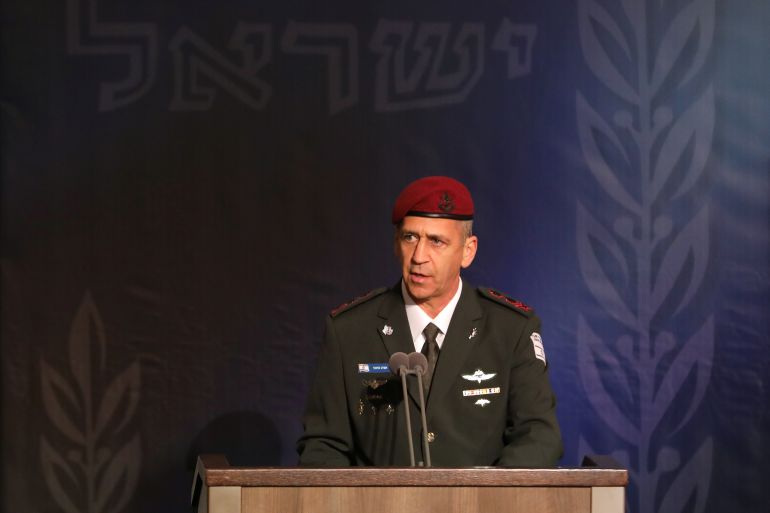Israel’s military chief says ‘accelerating’ Iran strike plans
Chief of General Staff Aviv Kohavi’s comments follow a series of warnings from high-level Israeli officials over Tehran’s nuclear programme.

Military plans dealing with Iran’s nuclear programme have been “greatly accelerated”, Israel’s military chief warned, as questions on the ability to revive a landmark accord limiting Tehran’s weapons development continue to grow.
Preparations for possible action against Iran are being intensified, Chief of General Staff Aviv Kohavi said in an interview published on Monday, adding “a significant chunk of the boost to the defence budget, as was recently agreed, was intended for this purpose”.
Keep reading
list of 4 itemsIsraeli PM says Raisi win a ‘wake up’ call over Iran nuclear deal
Iran nuclear deal faces challenging path, experts say
The Iran nuclear deal, six years on
“It’s a very complicated job with much more intelligence, much more operational capabilities, much more armaments. We’re working on all these things,” Kohavi told Walla news.
He also said efforts were under way throughout the Middle East to check Iran’s allies.
The main objective is “minimising Iranian presence in the Middle East with an emphasis on Syria … But these operations take place throughout the Middle East. They’re also against Hamas, against Hezbollah”, said Kohavi.
The commander-in-chief of Iran’s army, Abdolrahim Mousavi, replied to the escalating Israeli rhetoric by implying a decisive response should Israel attack.
“It appears the heads of the Zionist regime have felt the deterioration of their lifetimes and may want to commit suicide from fear of death,” he told reporters on Wednesday.
“They have many vulnerabilities and have previously experienced heavy and numerous defeats,” Mousavi said.
‘Enhance regional security’
US defence chief Lloyd Austin, speaking in Qatar on Tuesday, said Iranian military activity in the Middle East continued to ramp up tensions.
“Iran’s support for terrorism and its willingness to supply increasingly lethal weapons to non-state groups undermines the regional stability that we all seek,” said Austin.
“So we’re committed to working together to enhance regional security and regional defences against de-stabilizing actions – including Iran’s nuclear aspirations.”
The dispute over the 2015 international nuclear agreement with Iran remains one of the primary reasons for the high tensions in the region.
Since April, the other parties to the nuclear deal – China, Germany, France, Britain and Russia – have attempted to get the United States and Iran to return to the historic accord after Washington withdrew in 2018.
Iran has long claimed its nuclear programme is peaceful, noting it has worked with the International Atomic Energy Agency on its activities.
‘Goal-oriented negotiations’
Tehran has pledged its moves away from the 2015 deal would be reversed if the US returned to the agreement and lifted crippling sanctions that have devastated Iran’s economy.
Iranian President Ebrahim Raisi said on Saturday Iran was ready to hold talks with world powers to revive the nuclear deal – but not under Western “pressure”.
“Talks are on the agenda … We are seeking goal-oriented negotiations … so sanctions on the Iranian people are lifted,” Raisi said.
Meanwhile, Israel’s defence chief Benny Gantz recently urged the international community to develop a “Plan B” to prevent Iran from developing nuclear weapons – which he alleged Tehran was only two months away from acquiring.
“Iran has the intention to destroy Israel and is working on developing the means to do so,” said Gantz. “Israel has the means to act and will not hesitate to do so. I do not rule out the possibility that Israel will have to take action in the future in order to prevent a nuclear Iran.”